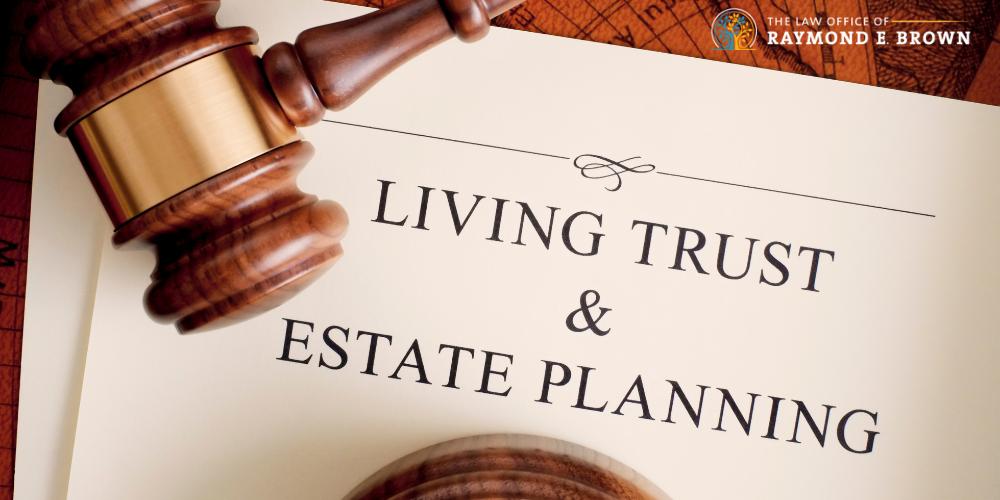Living Trusts
Home > Practice Areas > Trusts
Annapolis, Maryland Living Trust Lawyer
Experienced Trust Lawyer Serving Anne Arundel County, Washington D.C., and Beyond
If you don’t already have a plan for where your property will go after you pass away, it may be time to consider establishing a will or living trust. Having a will or trust in place can give you a much-needed sense of security knowing that all of your assets will be distributed properly and according to your wishes. But where to start?
If you’re located in Annapolis, MD or anywhere throughout Anne Arundel County or the surrounding areas, we highly encourage you to reach out to The Law Office of Raymond E. Brown as soon as possible. The attorneys at our law firm are extremely intelligent and well-versed in all things estate planning and can help you stay informed while guiding you through the entire process from beginning to end. To request our services or to simply learn more about your legal options, call (443) 554-9944 or complete our online contact form today.

What is a Living Trust?
First and foremost, what is a “living” trust?
Also called an “inter vivos” trust, a living trust is created by the grantor during the grantor’s lifetime rather than upon their death.
All of the terms of a trust are set out in the trust document itself. This usually takes the form of a deed, called a “Declaration of Trust,” and is governed by local law, so be sure to consult the laws of your own state. The trustee has the legal obligation to administer the trust according to the terms of the trust and in compliance with local law. If the trustee does not manage the trust properly, he or she can be held personally liable for any specific issues that arise. For example, where the trustee does not correctly invest in expanding the trust fund, many courts have found that trustee responsible for the lost income.
Benefits of a Living Trust
Living trusts are designed to help your family avoid probate proceedings following your death. Probate simply refers to the court-administered process of paying debts and distributing property to heirs upon one’s death. This is often a very timely and costly process. Heirs can expect to wait months before receiving anything, and by the time they do, the assets have likely already been diminished significantly by court costs and attorney’s fees.
Avoiding probate is not the only benefit that comes with creating a living trust. Other common reasons to create a living trust include:
- Reducing taxes;
- Ensuring financial privacy; and
- Regulating the use of assets (in case the owner becomes incapacitated).

How Do Living Trusts Work?
Living trusts are revocable and amendable. They are a substitute for a will in the sense that the trust will control the distribution of the property held by the trust. The property titled in the name of the trust will not go through probate, which is considered a serious advantage by many families.
Living trusts can also be very useful in disability situations, making it easier for loved ones to control the property. This use is often seen when parents are elderly and infirm and they appoint one of their grown children to be co-trustees with them. This arrangement allows the grown child to assist the parents when they need it. It is convenient for both the parents and the grown child.
To work, the trust must be appropriately funded. Accounts and real estate need to be transferred to the trust and beneficiary designations need to be updated to work with the trust.
Trust Planning vs. Will Planning
Trust planning can be more comprehensive than will planning. Trust-based planning may make estate tax planning work better. A trust can hold real property located in multiple states, avoiding multiple probates. Plus, living trusts may provide better control and segregation of property in second-marriage situations in the event of disability or death.
Maintenance Requirements of a Living Trust
When it comes to living trusts, there is quite a bit of paperwork involved. After the initial creation of the Declaration of Trust, the grantor must create and sign new deeds each time he or she adds an asset to the trust. For example, if the grantor decides to leave their own house to a beneficiary in the trust, the grantor must sign a deed, specifying that he or she owns the house as trustee of their living trust.
The continuous maintenance of a living trust can be burdensome and time-consuming. Luckily, however, the process can be made much more efficient with the help of an experienced Maryland trust lawyer.

The Importance of Also Having a Pourover Will
It may seem contradictory, but even if you have a trust to avoid probate, you may still need a will. When trusts are set up, people typically want to avoid probate so they hope that a will won’t be needed. However, estate planning is contingency planning, and a person could inadvertently leave property out of the trust, thus requiring a will to get it back into the trust.
Some jurisdictions recognize what is called a “Pour-Over Will.” This is a type of decree that orders all of the grantor’s property to “pour” into his or her Trust, at the Time Of Death. That way, all of the assets would be distributed to the beneficiaries named in the Trust, and none of the assets would fall into probate.
These wills are called pour-over wills because they generally have one major provision which says that if you find any probate property, then put it in the trust. Remember that the trust only controls property that is titled in the name of the trust, so if something is inadvertently left out of the trust, the pour-over will puts it into the trust.
Not all states recognize pour-over wills, but Maryland does. If you are not a resident of Maryland, be sure to check your state’s laws.
Will Having a Trust Lower My Estate Taxes?
In some cases, a living will can lower your estate taxes. A simple living trust does not affect taxes, but more complicated living trusts — which include numerous valuable assets — can substantially reduce estate taxes.
For example, an AB Trust (also referred to as “marital bypass trust”) is designed specifically for married couples with children. Each spouse leaves the other spouse property in the trust, for life, and then to the children. So if a husband and wife create an AB Trust and the husband dies, the wife receives all of the property of the trust. Then, when the wife dies, her interest in all of that property passes to their children. This AB Trust can potentially save up to hundreds of thousands of dollars in estate taxes.

How To Create a Living Trust in Maryland
Creating a living trust in Maryland is a crucial step in ensuring your assets are protected and distributed according to your wishes after your passing. While some may be tempted to pursue a do-it-yourself approach using online templates or generic guides, the most effective and secure way to create a living trust is to seek the help of an attorney who specializes in the planning of estates and related practice areas.
Estate planning can be especially complex and state laws may change, making it essential to have a legal partner who stays up-to-date with Maryland’s specific regulations. Experienced estate planning lawyers can tailor living trusts to their client’s unique circumstances and address any complications, such as tax implications, guardianship arrangements, and specific provisions for beneficiaries with special needs.
What’s more, an attorney can guide you through the often complicated legal process of trust planning, ensuring that all necessary legal formalities are met while minimizing the risk of errors or omissions that could invalidate the trust. By enlisting the expertise of a skilled Annapolis estate planning lawyer like those at The Law Office of Raymond E. Brown, you can experience peace of mind knowing that your living trust accurately reflects your intentions and safeguards the financial future of your loved ones.
Other Estate Planning Documents
You may already have a trust in place, but don’t forget that you likely also need, as mentioned above, a Pourover Will as well as an Advance Directive Form, a Living Will, and Durable Power of Attorney for financial affairs.
Funding Documents
At The Law Office of Raymond E. Brown, LLC, we prepare the funding documents when clients create living trusts. This typically means that we prepare a deed to transfer their home to the trust. We also prepare letters to be approved by the client that will transfer accounts into the name of the trust. We also update the beneficiary designations to make sure they fit with the estate plan.
Without proper funding, your trust will fail. It is the number one reason most trusts fail. For help with trust funding in Maryland, be sure to call our law office today.

Hire an Experienced Maryland Trust Attorney at The Law Office of Raymond E. Brown
It may seem like common sense, but it’s important that individuals seeking help with estate and trust administration reach out to a qualified law firm for legal advice, guidance, and to help ensure that all of their legal needs are met. At The Law Office of Raymond E. Brown, we focus our practice entirely on estate planning and administration in Maryland, so you know that we have the knowledge, experience, and legal resources it takes to handle your matter with ease.
Whether you have a complex estate or small estate, you’re single, divorced, military, or a business owner, our approach and system of processes will provide you with unparalleled legal representation. From living trusts to living wills to Medicaid planning and everything in between, you can rely on the Annapolis, Maryland estate planning lawyers at The Law Office of Raymond E. Brown to take care of you, your family, and your future.
Need help creating a living trust? Contact us today by calling (443) 554-9944 or by completing the online form on our website. Our lawyers would be happy to discuss your legal needs and address any concerns you may have in a completely confidential consultation.

